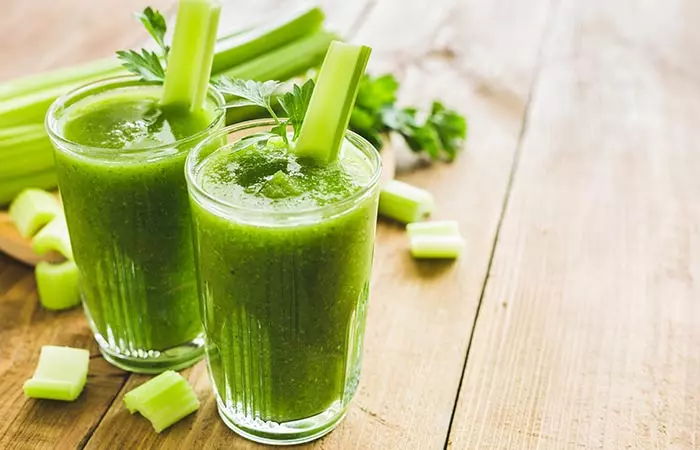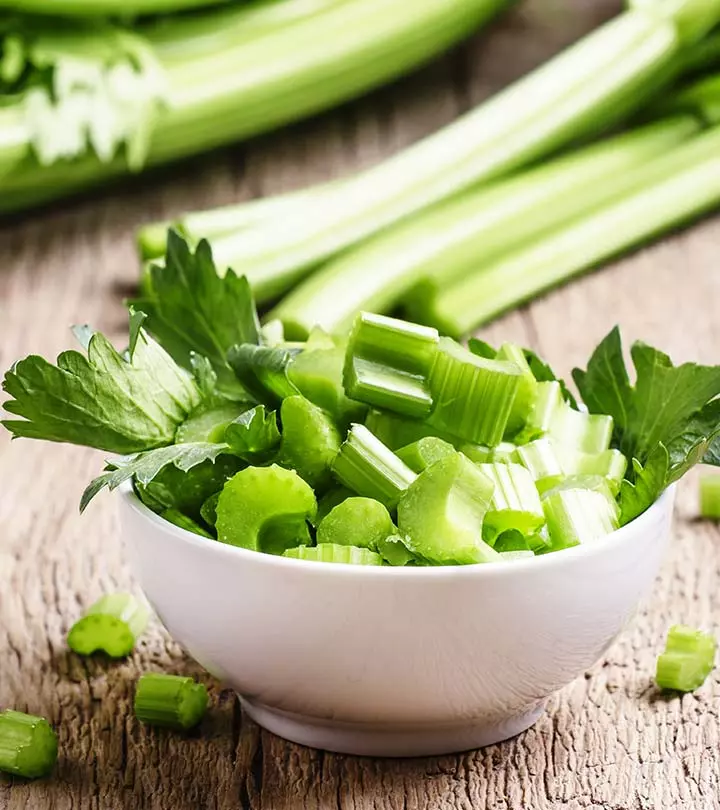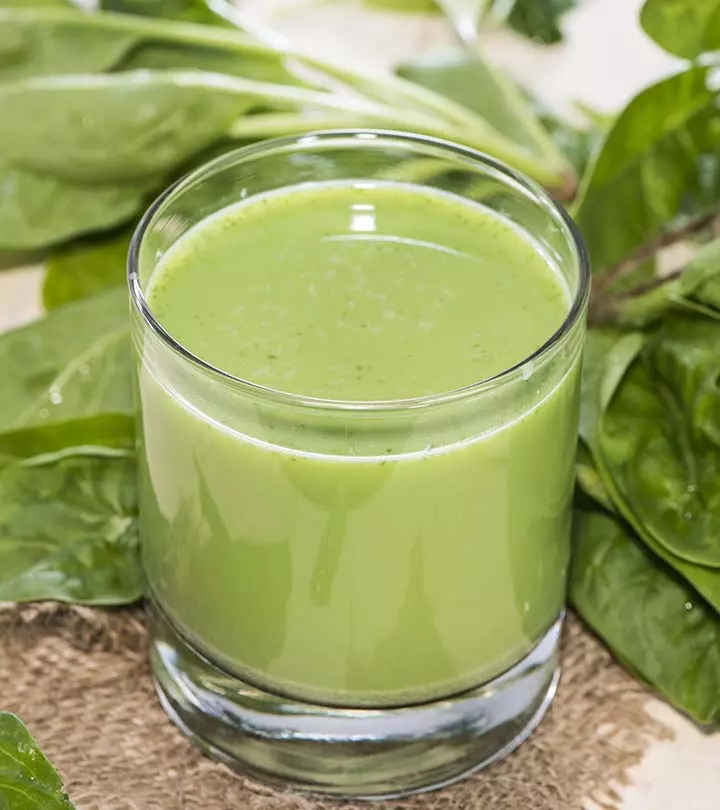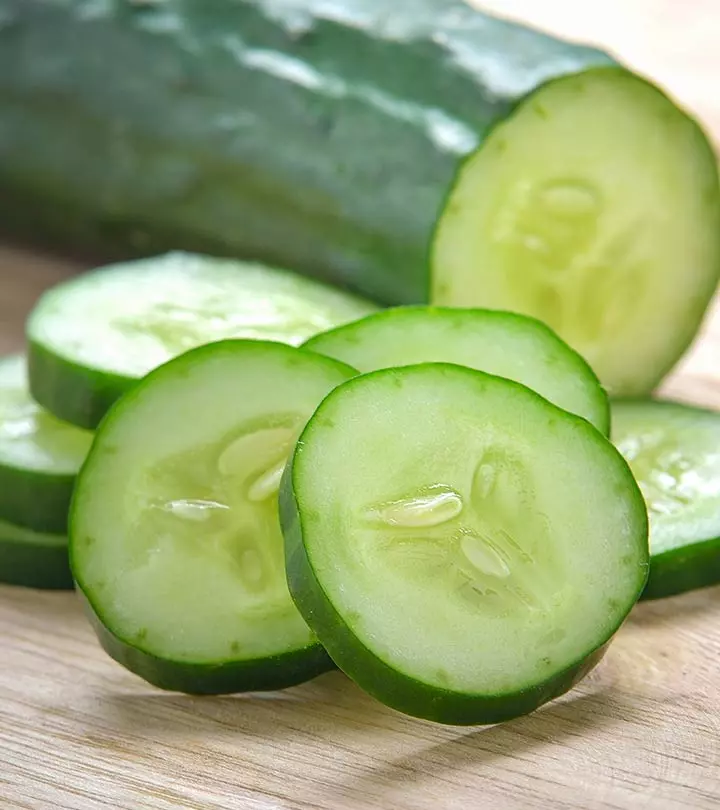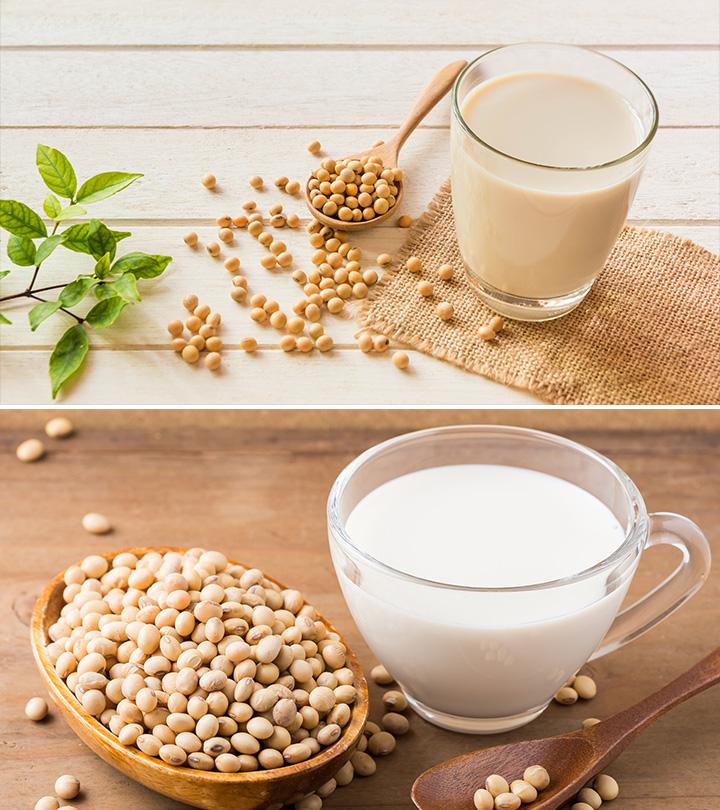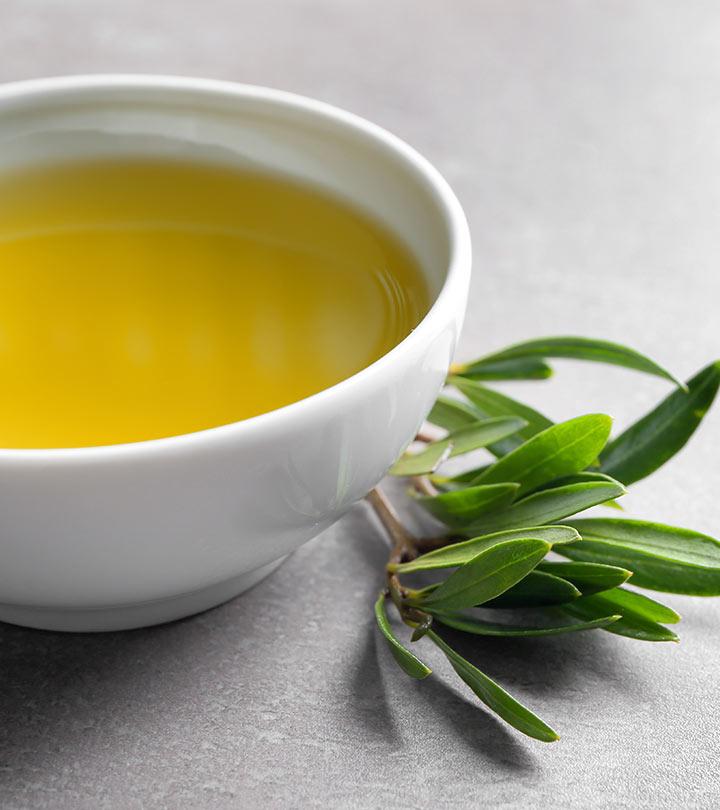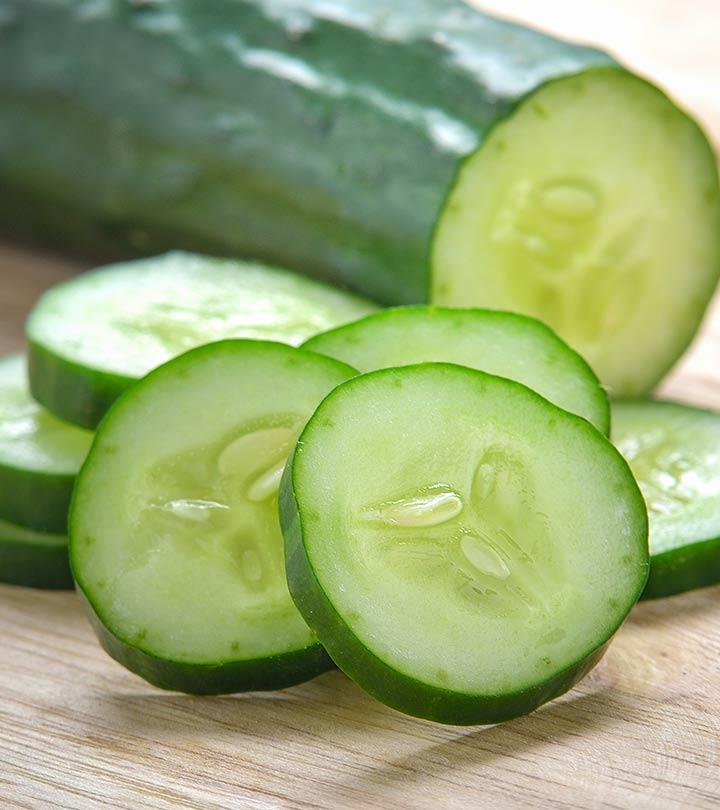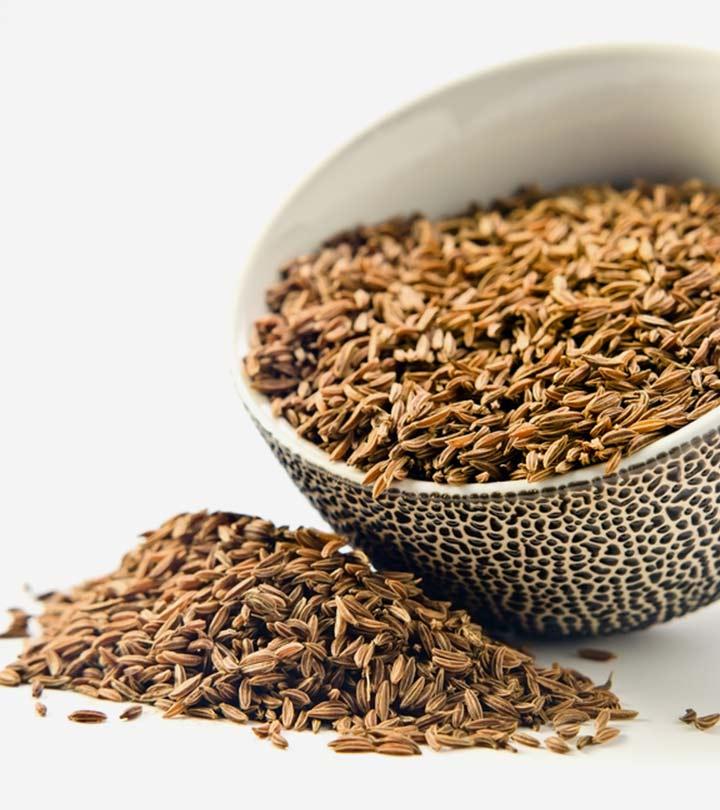13 Benefits Of Celery Juice, How To Make, And Side Effects
Loaded with all the essential nutrients, celery is the best drink to start your day with!
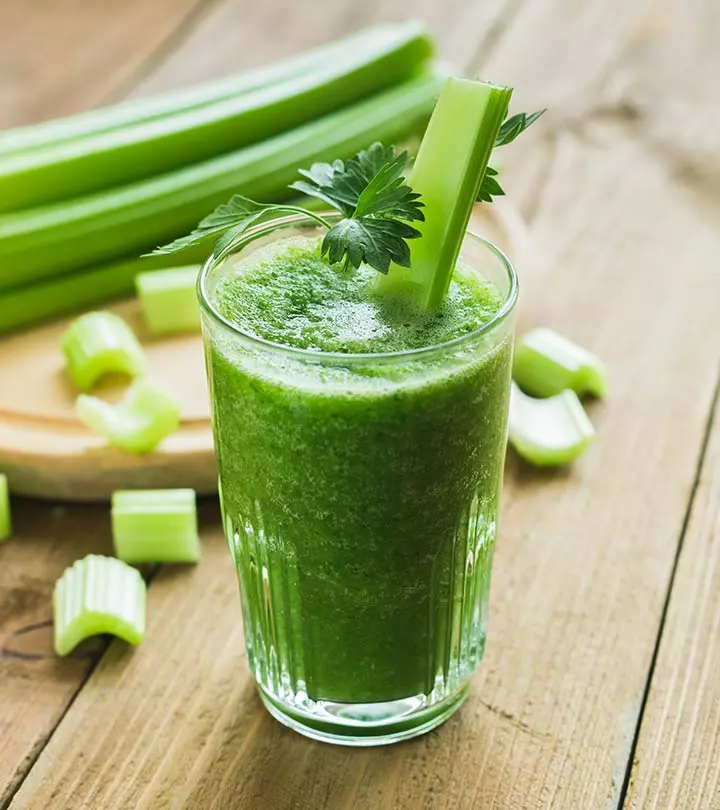
Image: Shutterstock
Celery juice benefits may convince you to include it in your diet. This nutritious vegetable is often used in salads. Alternatively, you can also blend celery leaves and stems into a drink to reap its benefits. Celery juice has a similar nutritional value as the whole vegetable. In addition, it is packed with powerful antioxidants, dietary fiber, potassium, essential vitamins A, C, K, and folate.
 Know Your Ingredient: Celery Juice
Know Your Ingredient: Celery JuiceWhat Is It?
Juice of celery leaves and stems.
What Are Its Benefits?
It has antioxidant and anti-inflammatory properties and helps with constipation, blood circulation, and lipid metabolism.
Who Can Consume It?
Those who want to promote heart health, improve sleep, maintain kidney and liver health, relieve constipation, detoxify the body, and enhance skin health.
How Often?
It can be consumed twice daily with food or on an empty stomach.
Caution
Individuals with high blood pressure and those on blood thinners should avoid consuming it.
This article discusses the benefits of celery juice and any potential side effects. Keep reading.
In This Article
What Is Celery Juice?
Celery (Apium graveolens L) is a plant from the Apiaceae family. This plant has been studied for its phenolic and antioxidant compounds (1). The juice of fresh raw celery is loaded with similar nutrients and biochemical compounds.
It’s a green hydrating drink that’s great for quenching your thirst or boosting your digestion. The natural flavor of celery juice can be bland or grassy, but you can enhance it by adding citrus fruits. Reap all of the benefits of celery juice by drinking it first thing in the morning.
 Trivia
TriviaA nutritious and healthy start to the day, it’s packed with beneficial compounds. Learn more about celery juice’s nutritional values below.
Celery Juice Nutrition
The following nutrients are present in about 100 g of celery juice (2):
| Name | Amount | Unit |
|---|---|---|
| Water | 95.4 | g |
| Energy | 14 | kcal |
| Protein | 0.69 | g |
| Total lipid (fat) | 0.17 | g |
| Carbohydrate, by difference | 2.97 | g |
| Fiber, total dietary | 1.6 | g |
| Sugars, total including NLEA | 1.34 | g |
| Calcium, Ca | 40 | mg |
| Iron, Fe | 0.2 | mg |
| Magnesium, Mg | 11 | mg |
| Phosphorus, P | 24 | mg |
| Potassium, K | 260 | mg |
| Sodium, Na | 80 | mg |
| Zinc, Zn | 0.13 | mg |
| Copper, Cu | 0.035 | mg |
| Selenium, Se | 0.4 | µg |
| Vitamin C, total ascorbic acid | 3.1 | mg |
| Thiamin | 0.021 | mg |
| Riboflavin | 0.057 | mg |
| Niacin | 0.32 | mg |
| Vitamin B-6 | 0.074 | mg |
| Folate, total | 36 | µg |
| Folate, food | 36 | µg |
| Folate, DFE | 36 | µg |
| Choline, total | 6.1 | mg |
| Vitamin A, RAE | 22 | µg |
| Carotene, beta | 270 | µg |
| Lutein + zeaxanthin | 283 | µg |
| Vitamin E (alpha-tocopherol) | 0.27 | mg |
| Vitamin K (phylloquinone) | 29.3 | µg |
| Fatty acids, total saturated | 0.042 | g |
| Fatty acids, total polyunsaturated | 0.079 | g |
Celery juice contains fiber, potassium, vitamins C, A, K, folate, and over a dozen other antioxidants. It is much lower in calories than other green juices (2).
While most people may benefit from drinking celery juice, some might have to steer clear of it. Find out which group you belong to in the section below.
Who Should Not Drink Celery Juice?
- Celery juice is generally safe for consumption by everyone, but it should be kept away from the following people:
IBS patients: Celery contains fermentable sugars such as mannitol, which may cause digestive issues when digested (3), (4). - Individuals with high blood pressure (hypertension) or those keeping a close eye on their sodium intake: Celery juice contains relatively high amounts of sodium. Thus, be careful not to overindulge in it (2), (5).
- Individuals on blood-thinning medications like warfarin: Celery juice is rich in vitamin K. This nutrient affects blood clotting and may hinder the functioning of blood-thinning medications (6).
While this nutritious drink may pose a problem for some people, it may prove extremely beneficial for others. So, what is celery juice good for? It relieves constipation, flushes out toxins, and improves blood circulation. Check out the extensive list of benefits of celery juice in the section below.
What Are The Benefits Of Drinking Celery Juice?
Health Benefits Of Celery Juice
1. May Help Relieve Constipation
Celery juice may cure various digestive disorders due to the abundant fiber present in celery.
Dietary fiber is needed to keep the digestive process moving. It helps in free bowel movements, thereby preventing constipation (7).
Give your meal smoothie a twist by adding celery stalks to it. Make sure you don’t filter the crude fiber out.
2. May Promote Cardiovascular Health
Plenty of evidence shows a strong relationship between oxidative stress and hypertension. Eliminating free radicals that cause oxidative stress can lower blood pressure. Vegetable juices made from celery leaves, kale, apples, cucumbers, lemon, and ginger might be ideal for this purpose (8).
Celery leaves contain flavonoids like apigenin that are potent antioxidants. These phenolic compounds affect lipid metabolism and accumulation.
Low serum cholesterol keeps hypertension, atherosclerosis, and other cardiovascular diseases at bay (8).
3. Possesses Anti-Inflammatory Properties
Inflammation can occur because of numerous factors like chemical and physical stress, allergies (hypersensitivity), infections, and poor diet.
Most of the times, inflammation is a result of compromised immune system. In other words, inflammation can also occur when your body is too weak to protect itself against any disturbance (9).
Including anti-inflammatory and low-starch foods in your diet can help a great deal. Celery juice is highly anti-inflammatory. It may help in reducing the severity of acute and chronic inflammatory diseases like osteoarthritis, rheumatoid arthritis, bronchitis, asthma, lupus, gout, Crohn’s disease, leaky gut, etc. (1).
This activity is attributed to the active ingredients like apigenin, apiin, and luteolin in celery juice (10).
4. May Reduce Liver Damage And Diseases
Celery leaves and stalks have antioxidant and anti-inflammatory effects on the liver. The polyphenols eliminate the accumulated toxins and free radicals in your body. They increase the activity of antioxidant enzymes like glutathione reductase, superoxide dismutase, catalase, etc. in your system (1).
This results in reduced lipid peroxidationi A chain of reactions caused when free radicals change the chemical structures of lipids (fats) and result in cell damage. and accumulation in your liver. Issues like non-alcoholic fatty liver disease (NAFLD), cirrhosis, and hepatic cancers can be well managed (11).
5. May Improve Sleep And Overall Brain Health
Recent research suggests that plant-based diets can improve sleep. Vegetables high in dietary polyphenols – like celery – might modulate the circadian rhythmsi Twenty-four-hour cycles with sleep-wake patterns that control daily schedules of alertness and sleepiness as per daylight changes. and sleep-wake cycles (12).
The apigenin in celery leaves exhibits potent neuroprotective and anti-inflammatory properties.
Adding celery to your breakfast smoothie not only gives it a nice texture but also kick starts your brain. It enhances memory by slowing down neuronal death.
The antioxidants and mineral ions protect your brain cells from chemical and pathogenic stress. Hence, celery juice might be a good choice for managing Alzheimer’s disease, memory loss (dementia), and neurodegenerative disorders (13).
6. May Work As A Diuretic And Maintain Kidney Health
Celery juice contains two essential minerals – sodium and potassium. These minerals act as the regulators of our body fluid. Hence, this juice is an excellent diuretic (14).
It facilitates the production of urine and prevents UTIs (urinary tract infections) or kidney troubles (15). Celery leaf extracts can restore minerals and water lost in the urine.
Celery juice can expel undesirable calcium deposits in your body through urine (16). This process prevents kidney stones, gallstones, atherosclerosisi Hardening of the arteries caused by a buildup of cholesterol plaque in the artery walls that can lead to heart attack or stroke. , etc.
7. May Enhance Fertility In Men
Rat studies in recent years show a positive association between fertility and celery intake. Traditional medicine uses celery to stimulate libido, protect the testes, and aid spermatogenesisi The process of sperm production within the male reproductive organs that begins during puberty and continues till death. (17).
The antioxidant capacity of celery helps in this aspect. Flavonoids like apigenin help in detoxification and shield the male reproductive organs from chemical stress. This, in turn, boosts the sperm count and viability (17).
Administering 100-200 mg/kg of celery leaf extracts to mice increased the size of their sex organs. Hence, celery juice may promote fertility in men (17).
8. May Maintain Acid-Base Balance In Your Body
The modern-day diet has a high dietary acid load. This can disturb the acid-alkaline homeostasis in your body. This chemical imbalance is often connected to chronic kidney and gallbladder disorders, especially calcification (stones) in these organs (18).
Eating vegetables that are alkaline can help to an extent. Celery stimulates alkali secretion in the body. It contains important electrolyte ions like potassium, magnesium, sodium, etc. (18), (19).
Its juice reduces acidity and controls the overall pH levels to some extent. Consuming it regularly can control uric acid levels, which are key contributors to calcification.
Celery Juice Benefits For Skin
9. May Help Detoxify Your Skin
Celery juice is one of the best detox drinks one could ask for! It is refreshing and alkalizing (18). The antioxidant and anti-inflammatory polyphenols in celery juice scavenge the reactive oxygen species in your bloodstream (1). Minerals like potassium and magnesium maintain the electrolyte balance and pH of your skin (2). When your body is free of toxins, it reflects on your skin.
Lara, a blogger, recounted her experience of drinking celery juice to treat a skin condition that developed after taking precipitation medications and giving birth to her twins. She said, “I went straight to celery juice, and I was so relieved (i).”
10. May Help Deal With Acne
Folate and vitamins A and C present in celery juice may help fight infections and inflammation (20). This natural remedy is rich in antioxidant content and presence of anti-inflammatory agents may help in clearing acne, blemishes, and pimples.
11. May Delay Early Signs Of Aging
Celery is packed with potent antioxidants such as apigenin, luteolin, tannin, saponin, and kaempferol (1). Antioxidants play an anti-aging agent and help neutralize free radicals.This protects cells from early death and also prevents the development of wrinkles and fine lines (21).
12. Helps Hydrate Skin
Celery juice is rich in nourishing components and water. It revitalizes dull skin and increases hydration. You may notice that fine lines and wrinkles are magnified when you are dehydrated. Thus, keeping your skin cells hydrated throughout the day is important for maintaining healthy skin (22).
Celery Juice Benefits For Hair
13. May Stimulate Hair Growth
The vitamin A in celery may activate the hair follicles and promote hair growth (2), (23). Research also suggests that while the correct dose of vitamin A may delay the onset of hair loss, its excess intake may actually lead to hair fall (23). While there is limited scientific evidence to support the idea that celery juice directly promotes hair growth, you can still give it a try. However, consume it in moderation to avoid any adverse effects. You may either consume the juice or use it as a hair mask with other ingredients, like aloe vera gel or coconut oil, for healthy hair growth.
When combined with the necessary exercise and diet, celery juice may aid hair growth. In short, celery juice keeps chronic ailments at bay. Adding it to your list of breakfast shakes is a must now. Here’s a quick recipe to make celery juice.
How To Make Celery Juice In Under 5 Minutes
What You Need
- Celery stalks: 1-2 bunches, medium-sized
- Water
- Juicer (or) High-speed blender
- Colander
Let’s Make It!
- Cut the bases and tops of the celery stalk bunches.
- Wash the stalks thoroughly in a colander.
- If you are using a juicer, feed the celery into the feeding tube.
- Once it’s done, serve it fresh.
- If you are using a high-speed blender, add the cleaned celery stalks to it.
- Pour 1/4 to 1/2 cup of water and shut the lid of the blender.
- Blend until you get a smooth mixture.
- Filter the contents of the juice through a muslin cloth into a pitcher.
- Squeeze the cloth at the end to drain out the remaining liquid.
- Serve the juice fresh with or without ice.
Tips To Make Celery Juice Tasty
- You can add green apple, kale, mint, cucumber, lemon juice, and ginger along with celery.
- You can also refrigerate this juice and have it cold on summer afternoons. Maybe with warm low-cal oats cookies.
 Quick Tip
Quick TipBut is it safe to drink this juice every day? Could celery juice have adverse effects?
What Are The Side Effects Of Drinking Celery Juice?
When you look at the macronutrient composition of celery, this juice is a treasure. But it is the micronutrients that can cause changes. The phytochemical composition might trigger certain side effects.
- May Cause Rashes And Photosensitivity
Celery has photosensitizing properties. It contains active substances, called psoralens, belonging to the furocoumarin family. Furocoumarin-rich foods can trigger phototoxicity. So, if you drink celery juice or eat it often, you might develop skin rashes and photosensitivity (24).
- May Harm The Kidneys
Having too much of celery juice can harm your kidneys. Celery, beets, lettuce, spinach, rhubarb, etc. have high amounts of dietary oxalates (100 g of celery has 190 mg of oxalate). Oxalate molecules interact with calcium ions in your body to form calcium oxalate deposits a.k.a stones (25). These stones affect the functioning of the kidneys. Calcification in the kidneys triggers inflammation (25).
- Carcinogenicity
You get readymade celery powder in the markets. You can use it to make the juice and other celery recipes. But, there are claims that this celery powder might cause cancer. Such ready-to-use ingredients have high salt, preservatives, and unnecessary chemical impurities.
But there is not enough scientific evidence that proves their cancer-causing abilities (26). Some evidence also suggests that the apigenin in celery has anti-cancer properties (27).
So, what is the best way out?
Well, healthcare professionals say that juice-based diets are hyped. Celery juice is said to be a great detox drink. But the truth is, a healthy liver does all the detox our bodies need.
The best way to get the nutrients from vegetables is to eat them whole – with the fiber intact. If you don’t like the texture and taste of the whole vegetable, celery juice is a welcome change.
Celery juice comes with a host of health and wellness benefits. However, if fresh celery isn’t available or you are allergic to it, here are some nutritious substitutes you could try instead.
Healthy Alternatives To Celery Juice
If you are looking for a hydrating drink, you can try:
- Cucumber juice
- Aloe vera juice
- Coconut water
- Lemon water
If you want to add some nutrition to your smoothies or juice mixes, try:
- Carrot juice
- Avocado
- Kale
- Spinach
Infographic: Celery Smoothie For Weight Loss
Celery is packed with many beneficial nutrients that offer a range of benefits. When paired with other equally nutritious ingredients, you can create a delicious smoothie that helps you lose weight and detox. Have this smoothie before or after your exercise regime to make the most of your workout.
Check out the infographic below for instructions on making a tasty, healthy celery-based smoothie that can help you shed those stubborn pounds. Illustration: StyleCraze Design Team
The Final Word
Celery juice benefits your health in many ways as it is packed with beneficial nutrients. This beverage is a good source of dietary fiber, vitamins, minerals, and phytonutrients. It may help ease constipation, improve sleep, and maintain the acid-base balance in the body. In addition, it has anti-inflammatory properties and may promote liver and kidney function. Celery juice is good for your hair and skin as well. However, when consumed in excess, it can cause problems. It may cause rashes, damage kidneys, and increase photosensitivity. If you experience any adverse effects, limit its use and seek medical advice.
Frequently Asked Questions
Is it best to drink celery juice on an empty stomach?
While it is safe to consume celery juice on an empty stomach, the benefits you get are the same as when you consume it with food.
Is celery juice good for your bones?
Yes, celery juice is good for bones. It is loaded with flavonoids that exhibit anti-inflammatory properties, which reduce the risk of arthritis and osteoporosis.
Why did my celery juice turn brown?
Celery juice will start browning if it is stored for too long. The change in color is a sign of spoilage.
How many times a week should you drink celery juice?
Everyday. You can have a glass or two of celery juice every day to reap its benefits and flush out toxins.
Is juicing celery better than eating it?
Possibly not. Celery juice has significantly less amount of dietary fiber than raw celery stalks. Thus, you may be missing out on the fiber content of celery when juiced.
What should I eat after celery juice?
You can have celery juice along with a fulfilling balanced meal packed with dietary fiber, protein, fats, and carbohydrates.
Why am I bloated after drinking celery juice?
Anecdotal evidence suggests that the fermentable starches present in celery juice, when digested, may lead to bloating and flatulence.
How long does celery juice last in the fridge?
Celery juice, if properly stored in an airtight container, can last a couple of days in the fridge and up to 6 months in the freezer.
Key Takeaways
- Celery juice has anti-inflammatory properties, so it reduces redness, puffiness, and acne. It also improves heart and brain function.
- The vitamins and minerals reduce blood pressure, weight gain, digestive problems, hair problems, and liver function.
- Celery juice may cause rashes, harm the kidneys, and carcinogenicity.
- People on blood thinning medications, individuals with hypertension, and IBS patients must not intake celery.

Image: Stable Diffusion/StyleCraze Design Team
Discover the remarkable effects of drinking celery juice every morning. Check out the video below to learn about the potential benefits of consuming this juice for your overall well-being.
Personal Experience: Source
StyleCraze's articles are interwoven with authentic personal narratives that provide depth and resonance to our content. Below are the sources of the personal accounts referenced in this article.
i. I DRANK CELERY JUICE FOR 30 DAYS AND THIS IS WHAT HAPPENEDhttps://shedripsblog.wordpress.com/2020/07/05/celery-juice/
References
Articles on StyleCraze are backed by verified information from peer-reviewed and academic research papers, reputed organizations, research institutions, and medical associations to ensure accuracy and relevance. Read our editorial policy to learn more.
- A Review of the Antioxidant Activity of Celery (Apium graveolens L)” Journal of Evidence-Based Complementary & Alternative Medicine, US National Library of Medicine.
- Celery juice.” Food Data Central, U.S. DEPARTMENT OF AGRICULTURE.
- Mannitol metabolism during pathogenic fungal–host interactions under stressed conditions” Frontiers in Microbiology, US National Library of Medicine.
- Dietary sorbitol and mannitol: food content and distinct absorption patterns between healthy individuals and patients with irritable bowel syndrome” Journal of Human Nutrition and Dietetics, The British Dietetic Association
- Sodium Intake and Hypertension” Nutrients, US National Library of Medicine.
- Interaction Between Dietary Vitamin K Intake and Anticoagulation by Vitamin K Antagonists: Is It Really True?” Medicine (Baltimore), US National Library of Medicine.
- Dietary Fiber” Diet and Health: Implications for Reducing Chronic Disease Risk, US National Library of Medicine.
- The effect of hydro-alcoholic celery (Apium graveolens) leaf extract on…” Avicenna Journal of Phytomedicine, US National Library of Medicine.
- Low-grade inflammation, diet composition and health: current research evidence and its translation” Br J Nutr., National Library of Medicine
- Effects of Juice Processing on Anti-inflammatory Flavonoids…” Department of Food Science and Technology, The Ohio State University.
- Hepatoprotective effect of feeding celery leaves mixed…” Pharmacognosy Review, US National Library of Medicine.
- Fruit and Vegetable Consumption and Their Polyphenol Content Are…” Nutrients, US National Library of Medicine.
- Neuroprotective effects of apigenin against inflammation, neuronal…” Scientific Reports, US National Library of Medicine.
- An Updated Phytopharmacological Review on Medicinal Plant…” Pharmacognosy Review, US National Library of Medicine.
- HYPOLIPIDEMIC HERBALS WITH DIURETIC EFFECTS…” Supplement Issue: Biological Science, IIOAB Journal, Academia.
- Anticalculi Activity of Apigenin and Celery (Apium graveolens L.) Extract in Rats Induced by Ethylene Glycol–Ammonium Chloride” Journal of Pharmacy and BioAllied Sciences, US National Library of Medicine.
- Effects of aqueous extract of celery (Apium graveolens L.)…” Avicenna Journal of Phytomedicine, US National Library of Medicine.
- Acid-alkaline balance: role in chronic…” Alternative Therapies in Health and Medicine, US National Library of Medicine.
- The Alkaline Diet: Is There Evidence…” Journal of Environmental and Public Health, US National Library of Medicine.
- Nutraceutical Effects of Curcuma, Ginger, Celery, Yeast…” World Applied Sciences Journal.
- Oxidative stress, aging, and diseases” Clinical Interventions in Aging, US National Library of Medicine.
- Dietary water affects human skin hydration and biomechanics” US National Library of Medicine.
- Diet and hair loss: effects of nutrient deficiency and supplement use.” US National Library of Medicine.
- A tropical skin eruption” The Canadian Journal of Infectious Diseases, US National Library of Medicine.
- Nutritional Management of Kidney Stones (Nephrolithiasis)” Clinical Nutritional Research, US National Library of Medicine.
- “Nitrates/Nitrites in Food—Risk for Nitrosative Stress and Benefits” Antioxidants (Basel).
- “Role of Apigenin in Cancer Prevention via the Induction of Apoptosis and Autophagy” Journal of Cancer Prevention, US National Library of Medicine.
Read full bio of Temple Stewart
Read full bio of Ravi Teja Tadimalla
Read full bio of Aparna Mallampalli









